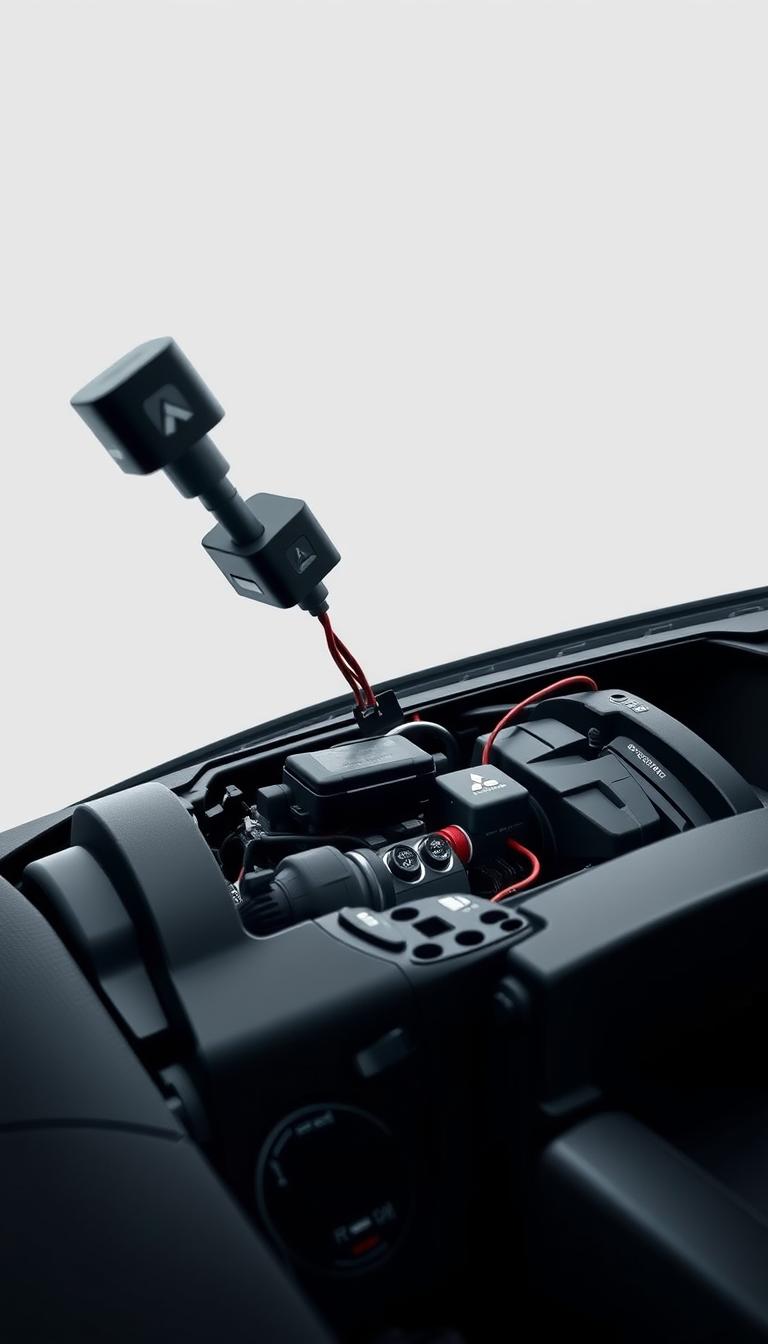Your Mitsubishi ASX Active Stability Control (ASC) system is a key safety feature. It keeps you safe on the road. This system watches your vehicle’s movements and stops skidding or loss of control in tough driving situations.
When your car faces sudden changes in traction, the ASC system acts fast. It applies brake pressure to certain wheels. This helps keep your car stable and improves your driving experience.
Knowing when to service your Mitsubishi ASX ASC system is important. It keeps your car running well and safe. Paying attention to warning signs and keeping this system in good shape is crucial for car owners.
Key Takeaways
- ASC system prevents vehicle skidding and loss of control
- Monitors vehicle dynamics in real-time
- Applies targeted brake pressure when traction is compromised
- Critical safety feature for Mitsubishi ASX models
- Regular maintenance ensures optimal system performance
Understanding the Mitsubishi ASC System Basics
Your Mitsubishi vehicle’s Active Stability Control (ASC) system is a key safety feature. It keeps you safe on the road. This system watches your vehicle’s performance in real-time to prevent dangers.
The ASC system combines many safety functions. It uses smart sensors and software to handle tough driving situations.
Key Components of the ASC System
The main parts of this skid prevention system are:
- Wheel speed sensors
- Electronic control module
- Hydraulic brake actuators
- Throttle control mechanisms
Vehicle Safety Enhancements
Your ASC system offers important safety benefits by:
- Reducing wheel spin during acceleration
- Preventing lateral skidding
- Maintaining directional stability
- Automatically adjusting engine power
Integration with Safety Systems
The ASC works with other safety techs like anti-lock braking systems. It constantly checks driving conditions. This helps you stay in control on slippery roads, sharp turns, or sudden moves.
Safety isn’t just about preventing accidents—it’s about giving drivers confidence in their vehicle’s capabilities.
Common Signs of ASC System Problems
Spotting early signs of an Active Stability Control (ASC) system issue is key to avoiding safety risks in your Mitsubishi. The anti-lock braking system is vital for keeping your vehicle stable. It’s important to know the signs of trouble to stay safe on the road.
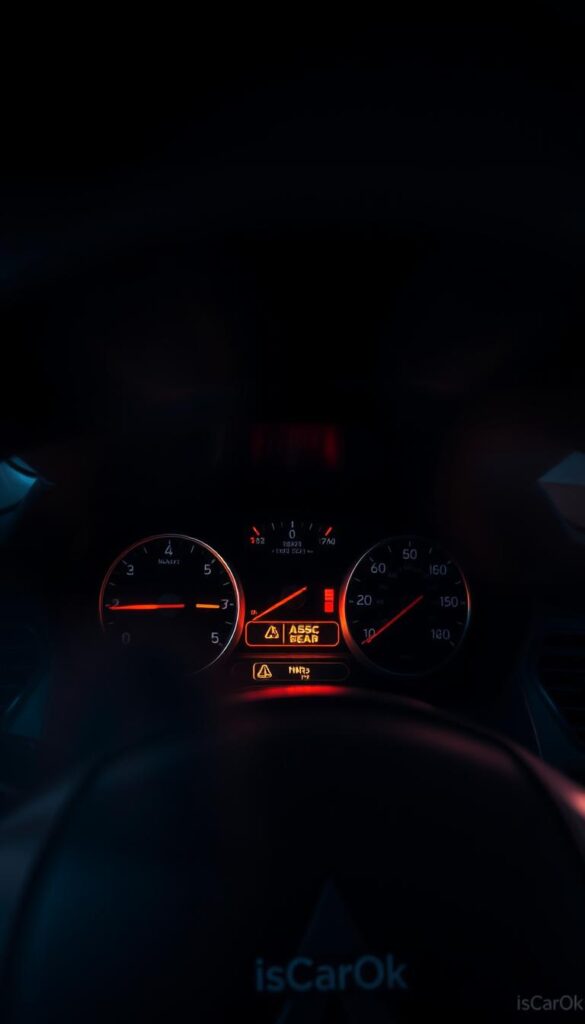
- Persistent ASC warning light on the dashboard
- Unusual vehicle handling during cornering or braking
- Reduced electronic brakeforce distribution performance
- Unexpected traction control interruptions
Don’t ignore these critical warning signals:
- Dashboard warning messages about the ASC system
- Brake assist not working right
- Unusual vibrations when you hit the brakes hard
| Warning Sign | Potential Impact | Recommended Action |
|---|---|---|
| ASC Light Illuminated | Reduced Stability Control | Immediate Professional Inspection |
| Inconsistent Brake Performance | Compromised Safety Systems | Diagnostic Evaluation |
| Traction Control Malfunction | Increased Driving Risk | System Check Required |
Drivers should never ignore these warning signs. If your vehicle’s ASC system shows any of these symptoms, getting a professional check is vital. It helps keep your car safe and running well.
What Does “Mitsubishi ASX ASC System Service Required” Mean
When your Mitsubishi ASX shows the ASC system service required warning, it means there’s a problem with your vehicle’s active stability control. This system is key for keeping your car stable during tough driving times.
The active stability control system stops your car from skidding and losing control. It watches how your car moves and steps in when needed. Knowing the warning signs can help fix issues before they get worse.
Warning Light Patterns
There are different warning light patterns for different problems. Here are the main ones to look out for:
- Steady ASC warning light: Shows a minor issue
- Blinking ASC light: Means a bigger problem with the electronic stability program
- Intermittent warning: Could be a sensor or electrical issue
Dashboard Messages and Their Significance
Your Mitsubishi might show specific messages when the ASC system has trouble. These messages give important info about the electronic stability program’s status.
| Dashboard Message | Potential Cause | Recommended Action |
|---|---|---|
| ASC Service Required | Sensor Malfunction | Schedule diagnostic check |
| ASC System Disabled | Electrical System Issue | Immediate professional inspection |
| Stability Control Off | Critical System Failure | Stop driving, seek immediate service |
Risk Assessment When Warning Appears
Ignoring the Mitsubishi ASX ASC system service required warning can be risky. Driving with a faulty active stability control system can lead to losing control in sudden turns or on slippery roads.
Safety first: If unsure, get your car checked by a pro to keep it safe and running well.
Primary Causes of ASC System Failures
Your Mitsubishi’s traction control system can face several failures. These can affect how your vehicle handles. Knowing these issues helps you spot problems early.
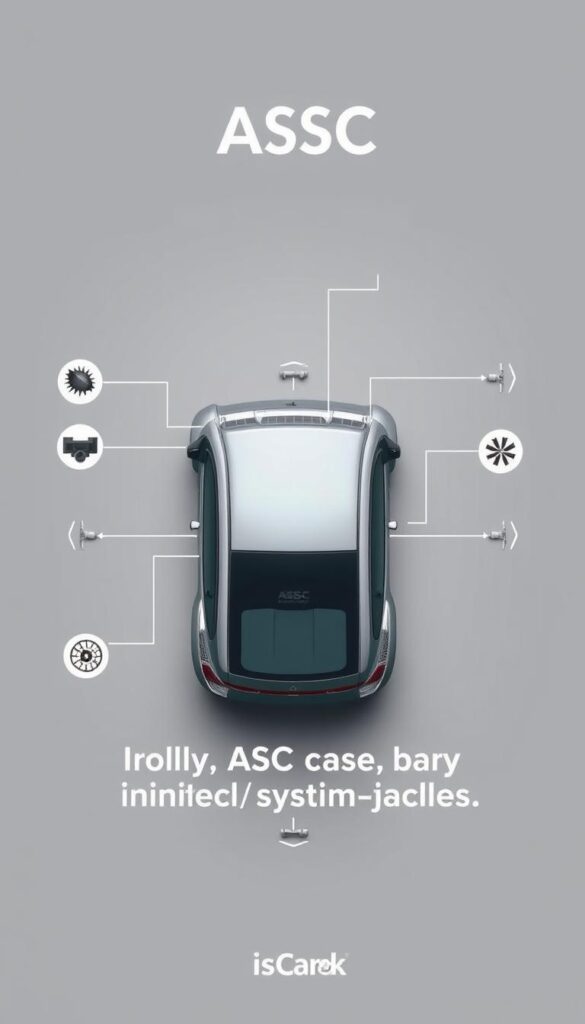
- Faulty ABS wheel speed sensors
- Electrical wiring complications
- Control module malfunctions
- Low brake fluid levels
- Software configuration errors
Wheel speed sensors are key to your skid prevention system. If they fail, they can turn on warning lights and affect your vehicle’s stability. Electrical problems often come from corroded connections or damaged wiring.
| Failure Component | Potential Impact | Diagnostic Difficulty |
|---|---|---|
| ABS Speed Sensors | High stability risk | Moderate |
| Control Module | Complete system failure | Complex |
| Wiring Harness | Intermittent performance | Easy |
Software glitches can pop up without warning. They need special tools to find. If you see ASC system warning lights often, get a pro to check it out.
Remember: Early detection of ASC system issues can save you from costly repairs and maintain your vehicle’s safety performance.
Proactive maintenance and regular system checks are your best defense against unexpected ASC system failures.
Impact of ASC System Malfunction on Vehicle Performance
When your Mitsubishi ASX’s ASC system malfunctions, you’ll see big changes in how it drives and stays safe. The anti-lock braking system is key for keeping your vehicle stable and in control. Any problem with it can really affect your driving.
- Less stability when turning
- Higher chance of wheels spinning
- Bad electronic brakeforce distribution
- Loss of traction control
Stability Control Challenges
Your car’s brakes and stability control don’t work right without a good ASC system. Drivers might find their car acts strangely, especially on wet roads or sharp turns. ASC warnings that come and go mean there’s a problem that needs fixing fast.
Traction Control Problems
With an ASC system that’s not working, traction control gets shaky. You might see:
- Wheels slipping when you press the gas
- Less grip on slippery roads
- Instability in four-wheel-drive cars
Braking System Effects
The brakes don’t work as well, making it harder to stop and less control over the car. Always think about safety first when you see ASC system warnings.
A broken ASC system can turn a simple drive into a risky situation.
Diagnosing ASC System Issues Using OBD-II Scanner
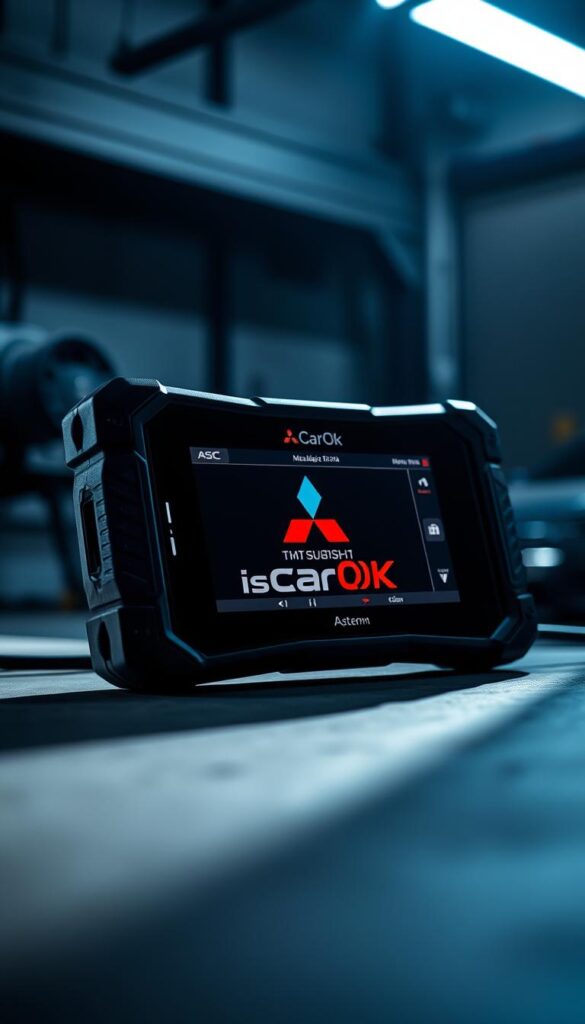
Fixing the Mitsubishi ASX’s active stability control system needs careful steps and the right tools. An OBD-II scanner is key for spotting issues with your car’s electronic stability program fast and right.
First, get a compatible OBD-II scanner for Mitsubishi cars. These scanners can find ASC system service required codes and give you detailed info on problems.
Steps for OBD-II Scanner Diagnosis
- Find the OBD-II port in your Mitsubishi ASX (usually under the dashboard)
- Plug in the right scanner
- Turn the ignition to “on” without starting the engine
- Pick the Mitsubishi vehicle make and model
- Go to the ABS/ASC diagnostic menu
- Read and write down the diagnostic trouble codes
When looking at codes, watch for specific error messages about the active stability control system. Common codes might show:
- Wheel speed sensor problems
- Brake system issues
- Electronic control unit (ECU) communication problems
Pro tip: Always check your vehicle’s manual or a pro mechanic if you’re not sure about specific diagnostic codes.
A pro diagnostic tool can save you time and avoid safety risks from ASC system failures.
The Role of ABS Wheel Speed Sensors in ASC Operation
Your car’s traction control system depends on advanced sensors for safety and performance. ABS wheel speed sensors are key in watching your car’s movements and stopping skidding.
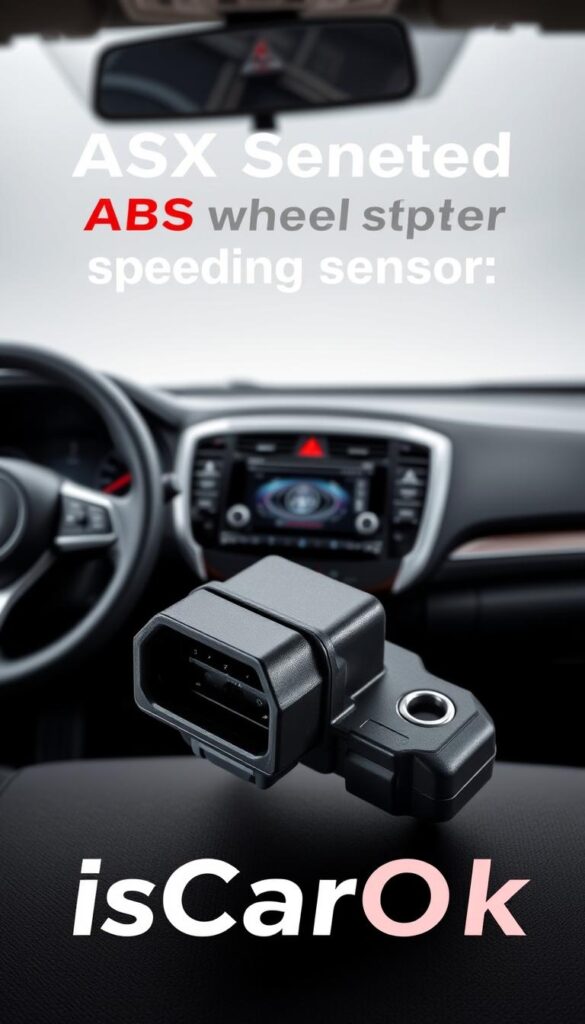
These sensors are vital for your vehicle’s control system. They track each wheel’s speed, sending data to your car’s computer in real-time.
Sensor Location and Functionality
ABS wheel speed sensors are placed near each wheel hub. Their main jobs are:
- Detecting wheel rotation speed
- Monitoring potential wheel lock-up scenarios
- Supporting skid prevention system operations
- Transmitting instant feedback to vehicle control systems
Common Sensor Failures
Spotting sensor problems early can avoid bigger issues. Look out for these signs:
| Symptom | Potential Cause |
|---|---|
| Illuminated ABS warning light | Sensor wiring damage |
| Erratic brake performance | Sensor signal interruption |
| Reduced traction control responsiveness | Sensor calibration issue |
“Maintaining your wheel speed sensors is crucial for consistent vehicle safety and performance.” – Automotive Safety Experts
Regular checks and quick sensor replacements are key. They keep your car’s safety systems working and avoid driving dangers.
Battery-Related ASC System Problems
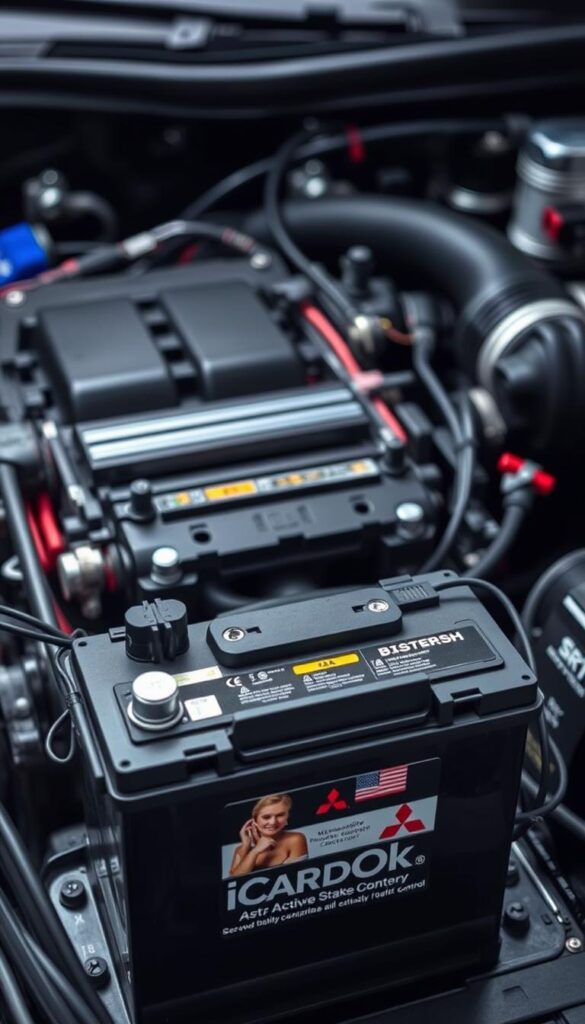
Your Mitsubishi’s anti-lock braking system (ABS) needs a strong battery to work right. A weak battery can cause unexpected warnings and mess with safety features like brake assist and electronic brakeforce distribution.
Battery problems can show up in different ways, affecting your vehicle’s stability control system:
- Unexpected ASC system warning lights
- Intermittent brake performance
- Electrical system instability
- Reduced responsiveness of safety mechanisms
“A healthy battery is the backbone of your vehicle’s advanced safety systems.”
Electrical issues often come from a parasitic drain, which weakens your battery over time. This drain can come from:
- Aftermarket alarm systems
- Malfunctioning electronic modules
- Faulty wiring connections
- Aging battery components
To avoid ASC system problems, check your battery’s voltage and condition often. Use professional tools to find electrical issues early, before they harm your vehicle’s safety systems.
| Battery Voltage | System Performance | Potential Risk |
|---|---|---|
| 12.6V – 13.2V | Optimal | Low |
| 12.2V – 12.5V | Marginal | Medium |
| Below 12.2V | Critical | High |
Proactive maintenance is key to ensuring your Mitsubishi’s advanced safety systems remain fully functional and reliable.
Importance of Regular ASC System Maintenance
Keeping your Mitsubishi ASX’s active stability control (ASC) system in check is key for safety and performance. If you ignore regular upkeep, you might face system failures. This can ruin your driving experience.
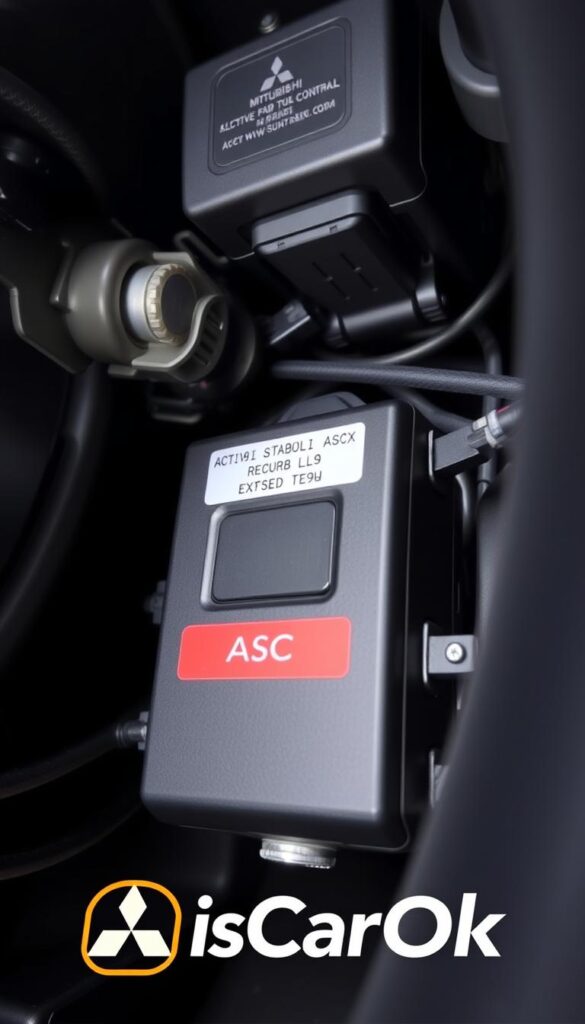
The electronic stability program needs regular care to avoid sudden problems. Regular checks help spot issues early, saving you from expensive fixes.
Essential Preventive Measures
To avoid ASC system service warnings, take these steps:
- Do quarterly checks on brake parts
- Look for wear on wheel speed sensors
- Watch your tire pressure and alignment
- Ensure electronic connections are clean and tight
Comprehensive Maintenance Schedule
Stick to a maintenance plan to make your ASC system last longer. Here’s a suggested routine:
| Maintenance Interval | Recommended Actions |
|---|---|
| Every 6 months | Brake system inspection |
| Annually | Complete ASC system diagnostic check |
| Every 2 years | Replace brake fluid |
| As needed | Sensor and electrical connection cleaning |
By actively maintaining your Mitsubishi ASX’s ASC system, you ensure safe driving. Regular inspections can save you time, money, and prevent safety hazards.
ASC System Reset Procedures
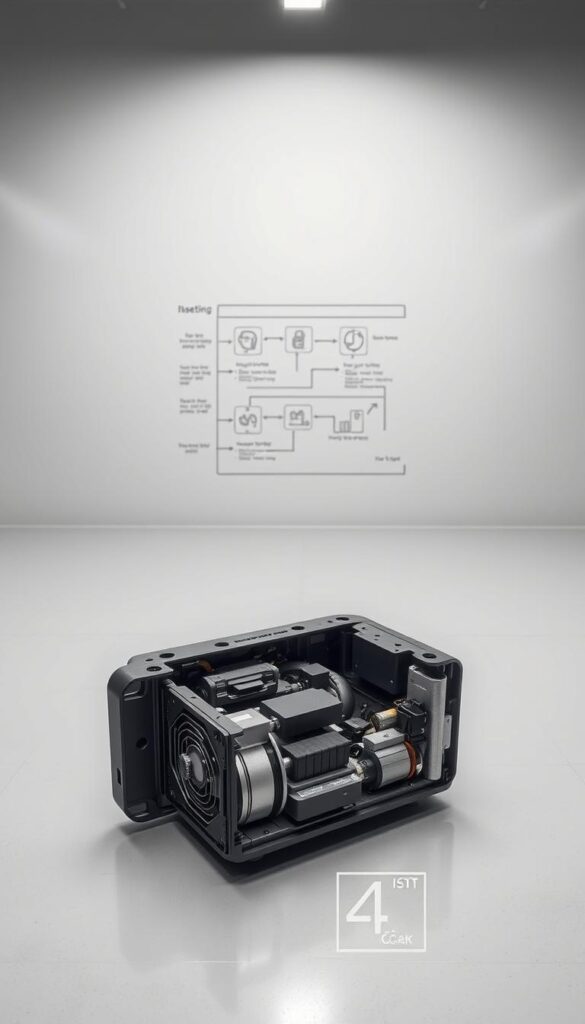
If your car’s traction control system isn’t working right, resetting the ASC (Active Stability Control) can help. The ASC system is key for keeping your car stable and preventing skids. It ensures your car drives smoothly.
Most cars with advanced safety features have an easy reset process. Here are the main steps to fix ASC system warnings:
- Turn off the engine completely
- Remove the key from the ignition
- Wait 3-5 minutes
- Restart the vehicle
If the simple reset doesn’t work, you might need to do more. Look in your car’s manual for specific reset steps for your car.
| Reset Method | Difficulty Level | Recommended Frequency |
|---|---|---|
| Basic Engine Restart | Easy | As needed |
| Battery Disconnect | Moderate | Rare |
| Professional Diagnostic Reset | Complex | When recommended |
Remember, if warning lights keep coming on, it could mean a bigger problem. In such cases, getting a professional to check your car is best.
When to Seek Professional ASC Service
Your Mitsubishi’s anti-lock braking system is key to safety. It needs expert care when warning signs show up. Knowing when to get help can avoid safety risks and expensive fixes.
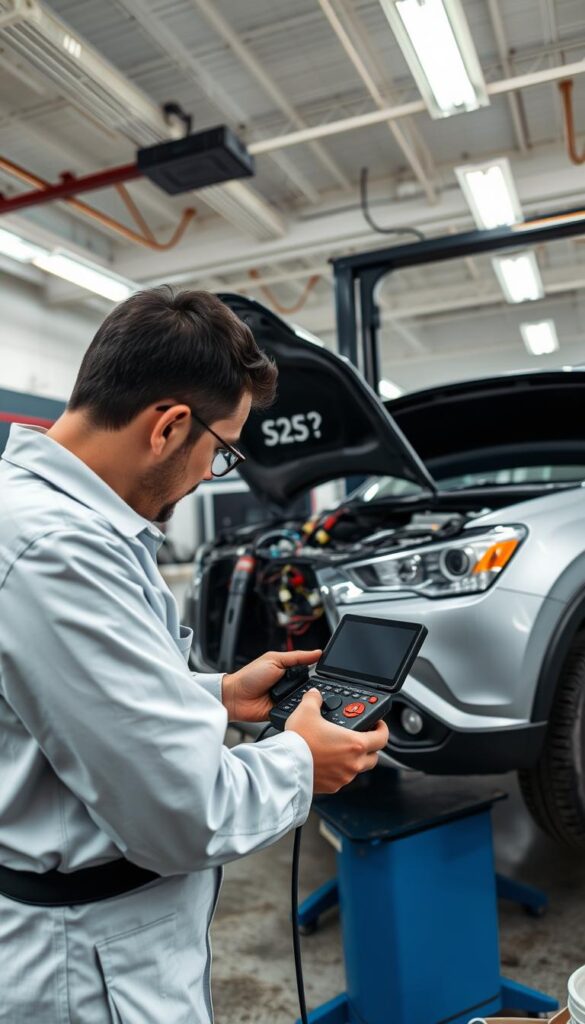
It’s important to know when to call a pro for your car’s brakes. This keeps your vehicle running smoothly and safely.
Critical Warning Signs
- Persistent ASC warning light on dashboard
- Unusual brake assist system behavior
- Vibrations or pulsing during braking
- Reduced vehicle stability during turns
- Unexpected brake engagement
Professional Diagnosis Benefits
| Diagnostic Advantage | Specific Benefit |
|---|---|
| Advanced Scanning Tools | Precise identification of system issues |
| Expert Technician Knowledge | Comprehensive understanding of complex brake systems |
| Specialized Repair Capabilities | Accurate component replacement and calibration |
Experts can spot tricky brake problems that regular checks miss. They use special tools and know-how to fix complex issues.
“Timely professional service can prevent minor brake system issues from escalating into major safety concerns.”
Getting professional ASC service keeps your car safe and running well. It also saves you money on big repairs later.
Cost Considerations for ASC System Repairs
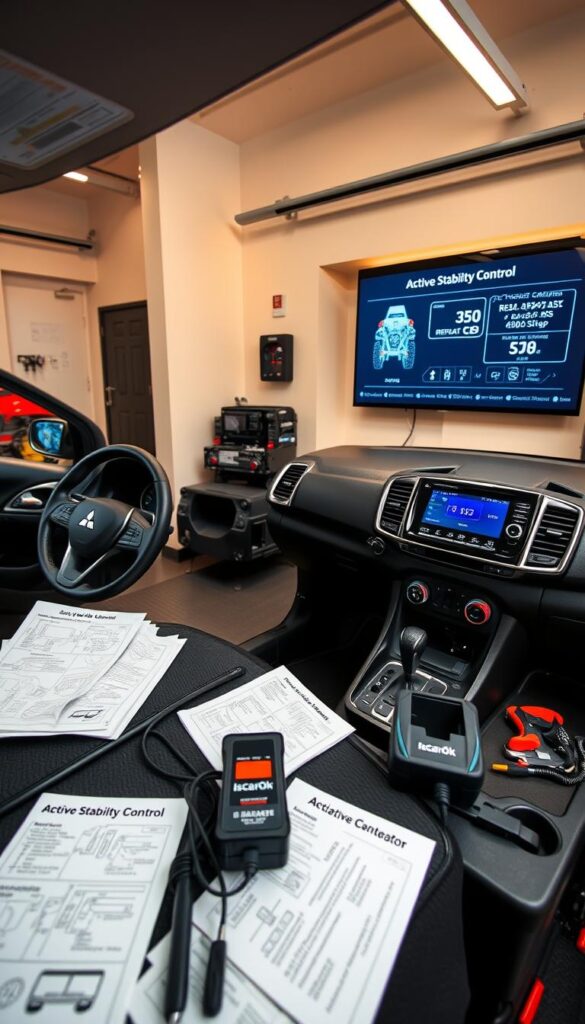
Knowing the costs for fixing the Mitsubishi ASX’s active stability control system is key. It helps you plan your budget better. The price for ASC system repairs can change a lot based on several important things.
Fixing the electronic stability program can cost a bit or a lot, depending on the problem:
- Sensor replacement: $100 – $300
- Wheel speed sensor diagnostics: $150 – $250
- Control module repairs: $500 – $1,200
- Complete ASC system replacement: $1,000 – $2,500
Even small issues with your Mitsubishi ASX’s ASC system can get big fast. Several things can affect how much you’ll pay for repairs:
- Specific component damage
- Vehicle model year
- Complexity of the electronic stability program
- Labor rates in your local area
Pro tip: Keeping up with regular maintenance can help avoid big repair bills. Finding problems early can save you a lot of money.
Always talk to a certified Mitsubishi technician for the right diagnosis and repair cost estimates for your ASC system.
DIY Troubleshooting Steps for ASC Issues
Keeping your vehicle’s traction control system in good shape is important. Knowing how to do basic checks can save you money and time. The vehicle dynamics control is a key safety feature that needs regular checks.
Initial Diagnostic Approach
Start by doing a thorough inspection. Look for any signs of corrosion or loose connections in the electrical system. These can affect your vehicle’s stability control.
Key Inspection Points
| Component | Inspection Method | Potential Issues |
|---|---|---|
| Wheel Speed Sensors | Visual check for damage | Broken wiring, sensor misalignment |
| Brake System | Check pad wear, rotor condition | Uneven braking, reduced control |
| Tire Condition | Pressure and tread depth test | Uneven wear, improper inflation |
Safety Precautions
When working on your vehicle’s electronics, safety comes first. Disconnect the battery before starting any electrical work. Always wear the right protective gear.
- Use insulated tools
- Work in a well-ventilated area
- Avoid loose clothing
- Keep a fire extinguisher nearby
Pro Tip: If you’re not sure about any step, get a professional mechanic’s help. This will prevent damage to your vehicle’s complex systems.
Environmental Factors Affecting ASC Performance
Your Mitsubishi’s anti-lock braking system can be greatly affected by different weather and road conditions. Various weather patterns and road surfaces can test the limits of your vehicle’s advanced safety control (ASC) system.
Extreme weather conditions can be tough on your vehicle’s brakes and stability control. Winter weather, in particular, can make things tricky for your car’s sensors and overall system.
- Snow and ice can disrupt wheel speed sensor readings
- Extremely low temperatures may affect electronic components
- Road salt can cause corrosion in critical brake system elements
- Deep water crossings might temporarily interrupt sensor signals
Knowing how weather affects your car’s brakes can help you understand system warnings. Most sensor issues are temporary and fix themselves quickly. But, if problems keep happening, you should get it checked by a pro.
| Environmental Factor | Potential ASC System Impact | Recommended Action |
|---|---|---|
| Extreme Cold | Reduced sensor sensitivity | Gentle driving, system self-check |
| Wet Conditions | Intermittent brake assist performance | Maintain safe following distance |
| Road Salt Exposure | Potential electronic component corrosion | Regular undercarriage cleaning |
Regular car maintenance and knowing how your car handles different weather can keep your Mitsubishi’s ASC system working well for a long time.
ASC System Updates and Technical Service Bulletins
Keeping your Mitsubishi ASX’s active stability control system up to date is vital. It ensures your vehicle stays safe and runs well. Manufacturers often send out technical service bulletins (TSBs) to fix issues and make the system better.
These updates offer many benefits:
- They make the system more reliable
- They fix software problems
- They improve how your car handles
- They help avoid safety hazards
The National Highway Traffic Safety Administration (NHTSA) has lots of info on ASC system updates. These changes often include important software updates that can really make a difference in your car’s performance.
| Update Type | Purpose | Frequency |
|---|---|---|
| Software Patch | Correct system algorithms | Every 6-12 months |
| Performance Upgrade | Improve stability control | Annually |
| Safety Enhancement | Address potential risks | As needed |
To keep up with the latest updates, contact your local Mitsubishi dealership or check the manufacturer’s website often. Keeping your ASC system in good shape can stop problems before they start and keep your car safe.
“Staying informed about your vehicle’s technical updates is key to ensuring long-term performance and safety.” – Automotive Safety Expert
Conclusion
Knowing about your car’s traction control system is key to staying safe on the road. The Active Stability Control (ASC) is vital for keeping your car stable. It helps you handle tough driving situations with ease.
By keeping an eye on your car’s skid prevention system, you can greatly improve its performance. Regular checks and quick action to fix problems are crucial. This keeps your car’s safety features working well. For more on battery issues, check out this discussion.
Getting your car checked by experts and keeping up with maintenance is essential. This ensures your car’s safety systems work their best. Being informed and quick to act makes driving safer for you and your passengers.
Your dedication to your car’s safety techs will give you peace of mind. It also makes your driving safer overall.

